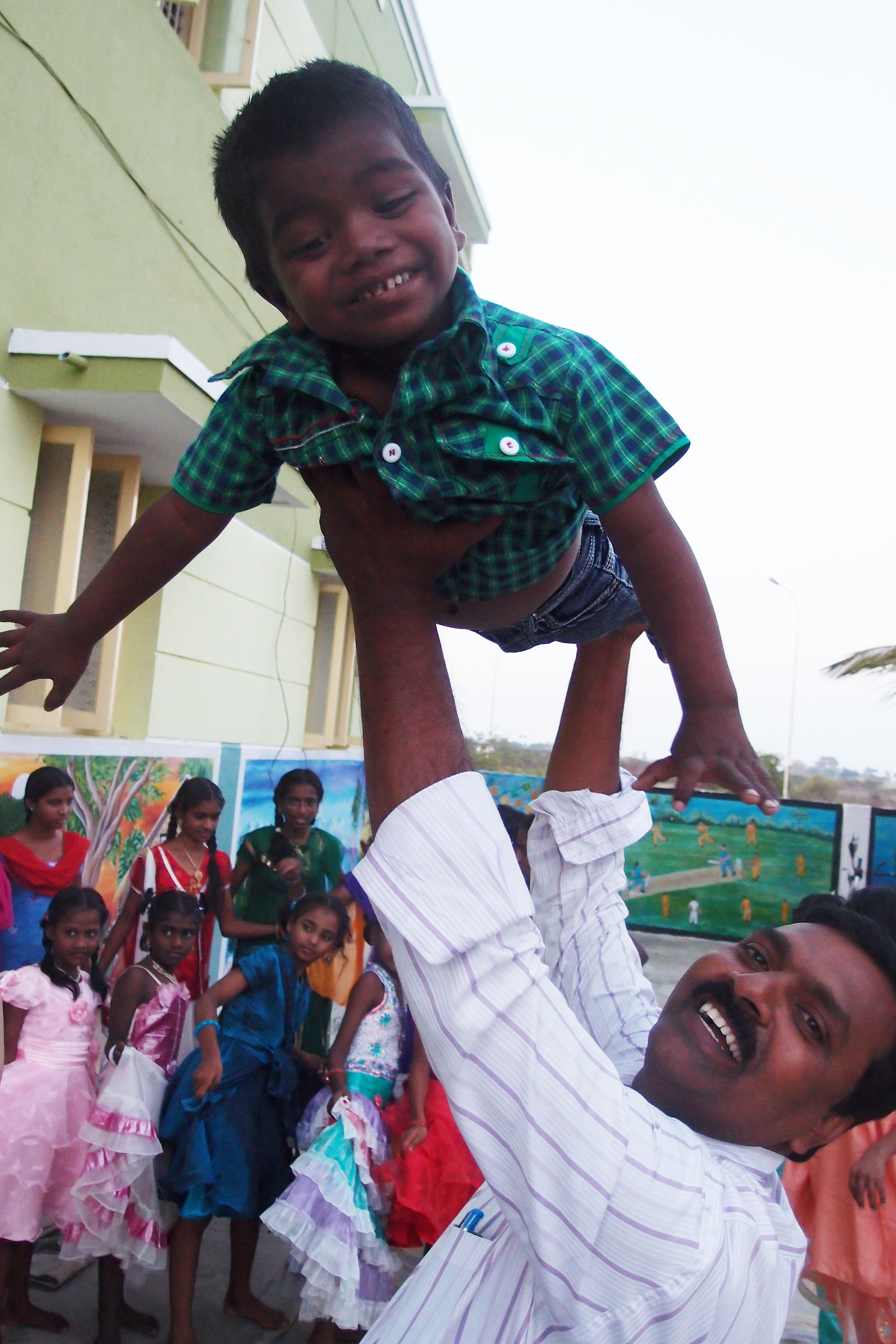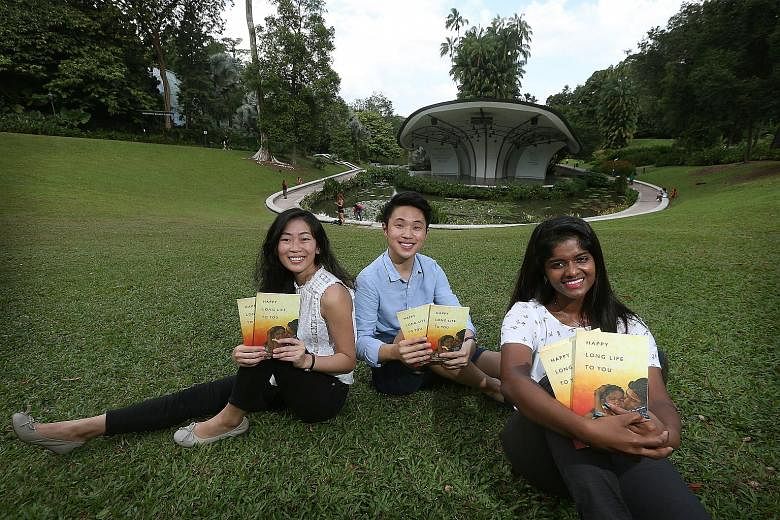They were three first-year medical students who had set their sights on Project Naadi, an overseas community project which included a stay at an orphanage for children with HIV in Chennai, India.
All three faced one stumbling block: disapproving mothers filled with misgivings because they did not want their children exposed to the virus which causes Aids.
Miss Elampirai Elangovan sums it up for Mr Yang Kaymond and Miss Nadia Sim when she says: "My mother was not supportive of the trip at all. But she is a mother; I guess her instinct is to protect."
It took a lot of persuasion and, in Miss Sim's case, negotiation, before they could go.
The trip changed the trio's lives.

What they saw and experienced at Shelter Home - set up by a man who juggles a few jobs to look after 43 abandoned children with HIV - in 2012 moved them so much they have gone back on two more occasions.
On their last trip in 2014, they spent 10 days talking to the founder, caretakers and children at the shelter.
With the help of a few friends, they wove these accounts into a book, Happy Long Life To You. A supportive mentor lent them nearly $6,000 to have the book printed and distributed.
The three medical students, now in their fourth year at the Yong Loo Lin School of Medicine at the National University of Singapore, hope to use the proceeds from the book sales for Shelter Home.
They also want to highlight the stigma and discrimination against HIV patients by celebrating the strength and selflessness of founder Solomon Raj and main caretaker Uma Kumar, a village girl who contracted HIV after she was tricked and coerced into prostitution. Her story makes up a big chunk of the book.
"What Uma went through, what she had to do to become what she is today, her strength and her beliefs sum up what Shelter Home is about. It is about the light at the end of the tunnel," says Miss Sim, 23.
Bright, articulate and brimming with youthful zeal and conviction, the trio signed up for Project Naadi in 2012, intrigued by its slogan: To see the unseen, to touch the untouched and hear the unheard.
Entirely led by student volunteers, the project started five years ago by working with rural communities and marginalised groups - from gypsies to lepers and those with HIV - in India. Three years ago, it came into the fold of Seeds of Nation, an outfit started by doctors supporting community work in India, China, Nepal and Thailand.
The second of three children of a former IT manager and a housewife, Mr Yang says he had at least half a dozen community projects to choose from as a first-year medical student.
"I went to some of the trip briefings. They usually conducted interviews to weed out applicants. I found that rationale a bit skewed. Project Naadi didn't require interviews. The leaders feel that if you have the heart to serve, no one has the right to tell you that you can't do it. I agree," says the 24-year-old, whose two siblings are also in university.
Nodding her head vigorously, Miss Sim adds: "Some of the interviews I went to were strange. They asked me questions like 'Would you rather be a spoon or a fork?'
"I was thinking to myself, 'What sort of OCIP does that?'" says the only child of a retired engineer and a housewife. OCIP stands for overseas community involvement programme.
Unlike the other two, Miss Elangovan, 23, was not new to OCIPs, having gone on several during her years in Raffles Girls' School and Raffles Junior College.
"Those trips were more educational and a lot of time was devoted to exploring the environment. I wanted to see if it stayed true to its intent for participants to form a relationship with strangers," says the eldest of three children of a news vendor and a housewife.
While she and Mr Yang were not too worried about interacting with children with HIV, Miss Sim lets on that she was fearful in the beginning.
"I heard seniors saying that if you have a wound, you have to dress it properly. I even heard stories of people using duct tape. I was like 'Oh my god, oh my god' because I have many cuts all over," she says, as her two friends break into peals of laughter.
More than 40 people, including students from other faculties, went on that first trip to Tamil Nadu in 2012. Before arriving at Shelter Home where they spent three days, they worked with and taught village children and visited a shelter for those suffering from leprosy.
The denizens of Shelter Home moved them for several reasons.
All the children are HIV-positive, and are in the home because they have lost their parents to the disease or have been abandoned because of their condition.
Before arriving at the shelter, one little girl was so sick from tuberculosis that she coughed up blood all over the hospital floor when she was taken there. Her grandfather, who had been looking after her, had difficulty walking and could not get her the anti-retroviral medication that she needed.
Miss Elangovan says: "They look like normal kids and talk like normal kids. But they know they are not like normal kids. They are very aware they have HIV and will run far away from you if they get a cut. It's sad because six-year-olds should not be like this."
All three agree that the home is exceptionally run, with a nurturing and loving atmosphere.
It is also why they find Mr Raj, 48, hugely inspirational.
His parents, both teachers, wanted their only son to pursue medicine but he left Hyderabad for Chennai to study theology instead.
He first thought of adopting a special needs or HIV-positive child when he and his school principal wife remained childless after eight years of marriage.
But before he could act on the idea, his wife conceived. The guilt of not adopting, however, bugged him. So when a friend rang him up and told him about Arputharaj, a dying child who had seen six HIV-related deaths in his family, he could not say no.
To keep Arputharaj company, Mr Raj, who has two children of his own, adopted another HIV-positive child. News spread and soon people were knocking on his door, asking him to save other HIV-positive children.
Miss Elangovan says: "It left him thinking, 'Why not? What makes this kid more or less deserving than the next one? I'm just going to do my best.'"
That was how Shelter Home started in 2006. It has not been an easy undertaking and Mr Raj - who teaches theology and sits on the boards of a couple of non-governmental organisations - often has to dig into his own pockets to keep his shelter going.
The three medical students feel that he could not have picked a better person to run the shelter than Ms Kumar, affectionately nicknamed Amma by the children she looks after.
Her parents died in an accident when she was very young, leaving her and two sisters in the charge of her grandparents.
Because she wanted to feed the family and craved the education she never had for her siblings, she believed two agents who went to her village promising jobs at a sewing factory in Mumbai.
She was sold to a brothel instead and contracted HIV not long after.
The brothel mistress threw her out and Ms Kumar went through hell - illness, abuse and ostracisation by her family and her village - before she ended up in a shelter in Chennai.
Her diligence and her loving nature saved her, and she wound up in Shelter Home where she is now protective mother hen to nearly 40 children. The 31-year-old is now married to a fellow caretaker at the shelter and gave birth to a healthy baby girl last year.
Mr Yang says: "Three days there was enough for me to know I wanted to come back."
Their decision to volunteer at Shelter Home the next year did not go down well with their mothers, especially Miss Sim's.
"She lost it. I'm an only child and she sheltered me like crazy. When she saw pictures of me with one of the kids, she asked me why I was so close to the child," she says, adding that her father, however, was very supportive of what she did.
She was, however, insistent about returning.
"Before the first trip, I was asked to write down what I wanted to achieve from the trip. I wrote down that I wanted to learn how to love and care for a stranger. I got that."
Miss Sim adds: "The children in the shelter really behaved like a family. It was such a beautiful thing to see, considering their backgrounds. Some had parents who didn't want them."
The idea of writing a book to raise funds came after their second trip in 2013. They wanted to do something more meaningful beyond washing cars and selling newspapers.
Their mentor, Dr Chua Ying Xian, a public health physician, encouraged the idea, even sponsoring their air tickets for them to go back to Shelter Home to do their interviews. He even lent them the $5,900 needed to get the book produced.
Happy Long Life To You comprises nine chapters. The trio wrote one chapter each and roped in five of their friends to write the remaining chapters.
"We worked out the structure and the chapters and came up with pointers for every writer to follow," says Miss Elangovan.
It took nearly two years to complete the book, published by Ethos.
Miss Sim says with a grin: "My mother came around. She is very proud now that the book is out. She has been sending it to all her friends."
The three friends hope to raise enough funds for Mr Raj to buy a plot of land not far from the shelter.
Mr Yang explains: "Right now, under Indian law, those who are 18 and above cannot live in the shelter. Uncle Solomon hopes to buy the land so that he can house the older kids and give them technical training."
Like his two friends, he says he has learnt much from Mr Raj and Ms Kumar.
"My multiple returns to Shelter Home have become less of an OCIP for I have found a home in Shelter.
"I have personally witnessed the unfortunate stigma against individuals living with HIV. With my pen, I hope to lend a voice to the underprivileged."
Read more stories from the It Changed My Life series here.


